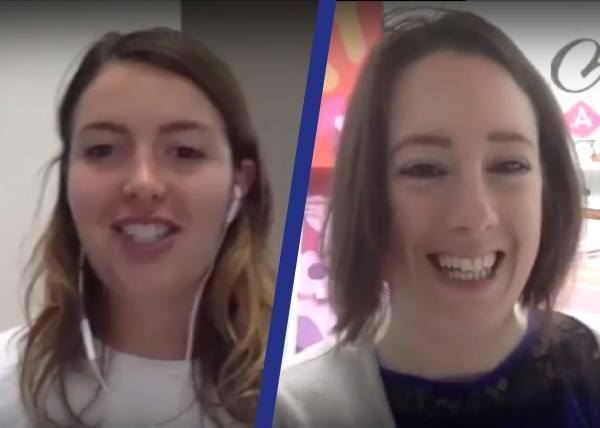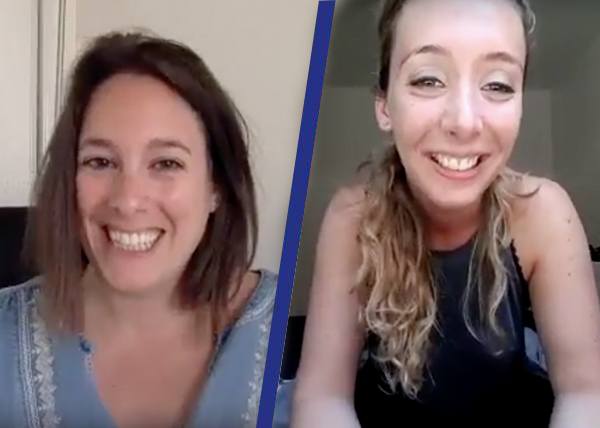Guillaume found his IT job in New York City first under a J-1 visa, then switched to a visa H-1B. He was actually the first person I followed, and his journey gave me a lot of tips and experience to create the service and tools I offer now on USponsor Me.
Here is our interview:
**The video is in French, activate the English subtitles directly in the video!!**
Discover how Guillaume found a job in IT in New York!
Sarah: Hello Guillaume!
Guillaume: Hello Sarah!
Sarah: So we are doing this video today to explain your journey to find a job in New York. I know you had several interviews in the city and on top of that, you were in a hurry because your girlfriend had been living there for about 6 months before you, correct?
Guillaume: Yes I believe we came at the beginning of August and she started working in September. I came as a tourist, and that allowed me to stay for a maximum of 3 months. I ended up going back to France at the end of October.
Sarah: Yes that is right, and all that time you never stopped looking for a job, even before you arrived in New York. Can you walk us through all of your interviews and what you learned from them and also how you did it all?
Guillaume’s story
 Guillaume: Well my girlfriend found out she was leaving for New York around March, and I started my job search at the end of March/ early April. At first, I targeted French companies because that can help you at the visa level. The first issue you’ll probably encounter is the visa.
Guillaume: Well my girlfriend found out she was leaving for New York around March, and I started my job search at the end of March/ early April. At first, I targeted French companies because that can help you at the visa level. The first issue you’ll probably encounter is the visa.
I had an interview with a French services company that had a subsidiary company in New York. I first had a phone interview there, then a second one in Paris at one of their offices, and then a final one with the head of the department. After that, I got an offer the offer depended on them obtaining a mission over there, so I believed in that offer very much.
And I said to myself: Wow! I found a job after only two weeks. That’s incredible!
I stopped looking for a job altogether.
Time went on, and as our plans to leave for New York drew closer, I started to wonder why that company was taking so long. So, I decided to start looking for a different position in the meantime, and I found different contacts with other French companies, but they ended up not working out because they didn’t really need anyone. After that, I started looking into working for an American company.
I learned that the H-1B visa is the most traditional visa for working over there, but that there are only a certain number of these visas available per year. The application for an H-1B visa is due in April and then delivered in October.
Sarah: Yes, and since your main goal was to leave as soon as possible, and you were looking for a job at the beginning of the summer you didn’t have time to wait until October of the following year to get a visa.
Guillaume: Those can really be an issue. I decided I instead needed a J1 visa, which is typically used for those in internship programs. But I was eligible under the trainee category, which applies to people who already have job experience. I went through 2 interviews that didn’t end up going anywhere.
How did Guillaume find a job in New York?
It is important to know Americans have a very different culture. They are very good at selling themselves, but it is unsure of how well they can perform on the job. In France, the opposite is true, and in my case even more so. I’m pretty shy, so it was pretty hard for me to sell myself as the best candidate, but it still ended up being a good experience.
I kept looking and started to get a little desperate. I had lots of responses, but every time there was an issue with the visa they used to say “no we do not accept the J1 Visa” or something like that. So I started turning in my applications in a way that didn’t make the J1 Visa an issue – I told them that I already found out and was with an organism that could sponsor my visa that would be good for 18 months.
I tried to put a positive spin on it.
When I had to go back to France at the end of October, I kept applying for jobs offers. Eventually, I found an American company co-founded by a French man and I applied to the company. I had my first interview there in French with the co-founder.
Sarah: That’s great!
Guillaume: Then, after I had a technical interview in English, I waited for them to contact me. After a while, I followed up with them a couple of times, because I didn’t hear back. They told me they still had 2 or 3 candidates to see, but I finally received a positive answer around mid-December.
Sarah: It’s wonderful that it ended up working out!
Guillaume: I sent all of the paperwork to the sponsoring organization and everything was filled out by December 20th. At the moment, I am currently waiting for my paperwork to leave for New York.
The interview process in general

Sarah: And you are also waiting for your embassy appointment, which should be scheduled soon. In regards to the 2 interviews, you had while in New York, were those American companies?
Guillaume: Yes, they were. There was one I got in contact with before I left. They offered me an on the spot interview. When I first came in we started to chat and they inquired about my experiences, etc. Then they asked more questions about what I had accomplished… that all seemed normal but then, all of the sudden, he tells me: “Ok, now I am going to have you do an exercise on the whiteboard.”
Sarah: Yes, the infamous whiteboard exercise!
Guillaume: It definitively threw me off; I never had to do anything like that when I had interviews in France. So, it certainly took me off guard.
I started a bit stocked and expected a negative outcome.
Sarah: Ok.
Guillaume: Then came the second interview. It started with a phone conversation, just as interviews I’ve had in Paris. They asked questions about my background and also more technical questions. Then they gave me an interview… no. Wait they gave me an on the spot interview with an exercise to solve at home. I preferred that because it gave me more time to think and work at my own pace, as you do in the real world. After that, I was summoned to the office, where I had a 4- hour interview. It was a lot and I basically, met with the whole team.
Each time, they reviewed my background and accomplishments and then moved on to more technical questions that were similar to the whiteboard problem.
Sarah: It seems like this process is pretty standard in the USA.
Guillaume: It was easier the second time because I knew what to expect. I don’t know if my answers were correct, but they were open-ended questions that might not necessarily have a correct answer. I don’t know. Also, they may have been looking for someone with more experience than me, because the job titles for both of these interviews were specified “senior”.
I don’t know how many years of experience are required to make you a senior, and maybe during these interviews, they didn’t think I experienced enough.
The interview process with his French company
Sarah: Ok, and after those interviews, you interviewed with the American company that was co-founded by a Frenchman, correct? Yes. So you had your first interview with him in French, and he also asked you to do some problem-solving exercises?
Guillaume: No, that one went a little differently. The second interview was the technical one. That one was with the head of the department, and she followed the same structure: she asked me about my background and then asked more technical questions. But there wasn’t a test.
I really believe the fact that there was a Frenchman in the company helped because he understood the culture, and that made it a lot easier to share my own views.
Sarah: Yes. And since you mentioned that, can you please remind us what your job title is? I know it’s in the IT department, but what position exactly?
Guillaume: Yes. I had an IT job in France, and my position there was Study Developmental Engineer, and specifically for software like Java in the US, this position is called Software Engineer.
What job strategies did Guillaume use?
Sarah: So were all these applications spontaneous? Or were they ads that you applied for?
Guillaume: When I started by looking for jobs in French companies, I applied more spontaneously because they didn’t have any advertised openings. But the American companies had more openings available, and I responded to many of these offers.
I had everything ready to go. I did take the time to tailor my resume and cover letter to each job offer, but I still sent loads of them out.
Sarah: Do you have any idea how many jobs offers you answered?
Guillaume: A huge amount! To be honest, probably more than 50. I don’t even know.
J-1 visa details
Sarah: And in regards to the J-1 visa, did you pay for it? Did you prepay and get reimbursed after talking to the company? How did the job in New York end up working out?
Guillaume: Well, since I pitched the visa as uncomplicated for the company, I paid for it all. The price depends on the training’s time length. In this case, it is 18 months and costs about 2800 euros. That doesn’t include health insurance, which is provided by the organization.
Sarah: What is this health insurance? Is it the same as immigrant insurance?
Guillaume: I think it’s a local contract they already have in place.
Sarah: Ok and your J1 sponsor offers this health insurance.
What organization sponsored you?
Guillaume: I used Intrax. At one point I was looking for trainee organizations that offer trainee jobs. That was because I was telling myself I wasn’t able to find a job myself, so I signed up for these organizations and saw job offers that could interest me. But when I got in touch with them, they told me that usually, this kind of training is either very little or no pay. That wasn’t what I was looking for at all, but this organization was very responsive. I went through them when I found out I had been accepted into my company.
Sarah: With the J1 visa, there are no wage standards. So in your case, it was a real job and you were able to talk them into the right salary according to your experience?
Do you see yourself working in IT in the USA or New York, just like Guillaume? Let’s discover which VISA you need here!
Guillaume: I didn’t really ask for anything when they called to tell me I had gotten the job; he told me what my salary would be and told me it was what everyone on the team was paid, so it seemed fair to me. I didn’t feel like I should negotiate for more, but later on he told me that I still had a year and a half left so for my wages it will not be possible to match up the other team members salaries as I was going to be only a trainee so he lowered it a little. But the salary is still decent when you include my training bonus.
Sarah: Very good. How about the other team members? Are they all Americans?
Guillaume: I never asked, but yes, I believe so.
Company’s sponsorship background
Sarah: So you are the first J1 employee at the company? Have they done it before?
Guillaume: No, I am the first one. It’s a pretty small start-up.
Are you looking for a job in New York? Learn how to write a resume here.
Sarah: They may never have had any requests for it.
Guillaume: Yes, I do not think they knew about this visa, because he questioned me about it. They weren’t used to filling out this type of paperwork, and there were quite a few exchanges with the sponsor.
Sarah: You really helped them out by finding a visa organization yourself. You put everyone in touch to fill out the paperwork and worked hard to make sure your employer wouldn’t have to do too much to get you your visa.
Guillaume: Yes and now I understand why American companies do not necessarily want to hire people who need visas. Overall, it’s much more work…
J-1 and then H-1B?
Sarah: The visa process is more complicated for them, and even though the J1 is the easiest visa to obtain, you still had to fetch the information; even if we don’t know what are your intentions for the future, would it be possible for you to switch to an H1B?
Guillaume: Let’s just say the organization I went through wouldn’t like this idea at all. It’s an exchange program, and the assumption is that I’ll return to France to apply the new skills I learned while in the USA. Based on my own internet research, it is still possible to go from a J-1 to H-1B visa but the process requires a lawyer.
One year after this interview, Guillaume obtained an H-1B visa sponsored by his company.
Guillaume’s professional background
Sarah: In regards to your professional background before the United States, what diplomas do you possess?
Guillaume: I have an Engineering Diploma.
I entered the workforce in 2008. I worked for a service company for 5 years and then decided to work for myself for a year and a half. After that, I started looking for a job in the US.
Sarah: So you were a freelance worker for a while in France?
Guillaume: Yes. I was self-employed.
Sarah: Ok and your engineering diploma in IT was at the master’s level?
Guillaume: Yes, that is right.
What about retirement and 401K?
Sarah: Just one last question.
Are you able to save for your retirement via a 401K in the US or France?
Guillaume: No, nothing like that is included in the J-1 visa program. Often this is considered a “benefit” offered in addition to salary. For the job in New York, they didn’t mention it, so I plan to save money on my own! That’s just the way I have to do it!
Sarah: At this time I am not putting any money into my 401K and my retirement, but it is true it is ok for 18 months; but this can be an important issue for a more long-term job. We are all done. Do you have anything else you would like to add?
Guillaume: I think we covered it all.
Sarah: Very good. Thank you very much for this interview, Guillaume.
Guillaume: You are welcome.
Sarah: I’m sure it will be very helpful for anyone who wishes to live and work in the United States.
Find all the other success stories. Are you looking for an IT job in New York City? Tell us your story in the comments below!



